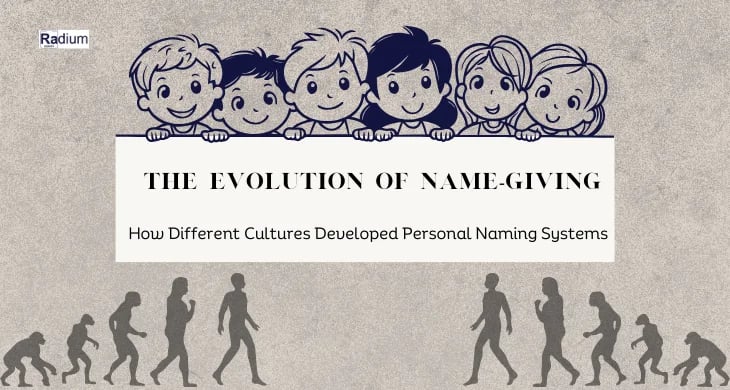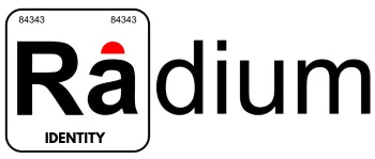The Evolution of Name Giving: How Different Cultures Developed Personal Naming Systems
The process of bestowing on nouns a name is the core of human identity, representing cultural origin, social expectations, and historical background.
Shubhanshi
3/1/20255 min read


The process of bestowing on nouns a name is the core of human identity, representing cultural origin, social expectations, and historical background. Name designation is not only a label, but also a marker of a person's lineage, social standing and even religious convictions. Over time, various cultures created different naming systems on grounds of languages, religions, and social structures. The development of such systems illustrates the variety of ways in which societies have dealt with the process of naming, which reveal their culture, norms, and traditions. This article examines the development of the evolution of names in different cultures, its meaning, and its continuing influence on the construction of the human identity today.
Ancient Naming Systems
1. Mesopotamia and Egypt
Naming systems among the oldest recorded can be traced back to Mesopotamia and ancient Egypt. Names in these cultures often carried deep meanings, with Mesopotamians incorporating elements of divine protection or accomplishments. E.g., names like "Naram-Sin" (the "Beloved of Sin" preceded their religious service and religious, god-worshipping reverence. Mesopotamians frequently employed descriptive and theophoric names—that is, the names of deities—which are based on their conviction that divine blessing plays a central role in identity.
Equally in ancient Egypt, names were quite literally imbued with religious meaning, with their associations with gods and the realm of the dead being common. Many Egyptian names contained references to deities, such as "Ramses" (meaning "Born of Ra" or "Tutankhamun" (meaning "Living Image of Amun". Besides religious interpretations, Egyptian names occasionally reflected personality traits, successes, or ambitions. Namely, the names of pharaohs, more often than not, sometimes underscored their divine claim to rule and their relationship to the gods.
2. Ancient China
Naming practices in ancient China were hierarchically ordered based on Confucian concepts of family and social hierarchy. With reference to their ancestors, the individuals would already have a family name (surname), and a personal name that denoted virtues, wishes, or important occurrences. Family name was given a high importance to it because it in fact was lineage and continuity. Among the origin of the Chinese surnames, some of them were the result from geographical location, ancestral occupation, or a title of nobleman.
Additionally, scholars and individuals of high status often received a courtesy name "zi", which was used in formal settings or among peers as a mark of respect. Adoption of a courtesy name served as a means for people to preserve an aura of dignity and formality in social interactions. And in the following dynasties another form of name (hao) could be adopted, as an accentuation of the social identity, often for literary persons.
3. Greek and Roman Traditions
The Greeks used a direct system of naming, which always included a top name and a patron. The patron indicated the father's name, such as "Aristotle, son of Nicomacus", help to establish the dynasty. The Greek names were often obtained from words that expressed meaning, such as "sophocles" (meaning "knowledge and glory". The use of epithets was also common, especially for distinguishing individuals with similar names.
Praenomen (individual names), nomain (clan name), and cognomain (family line or surname surname). For example, the name "Guece Julius Caesar" follows this structure, where "Guse" is individual names, "Julius" represents the Julian clan, and the "Caesar" was originally a cognitive title. The Roman system of naming facilitated accurate person identification, as well as a person's status or identity within the world of Rome.
4. Medieval and Renaissance Naming Conventions
European names were strongly shaped by religious influences in the Middle Ages. Spread of Christianity precipitated many folk names to be primarily based at the Bible and names of saints to end up popular. Names like "John," "Mary," "Matthew", and "Catherine" had been often used due to the fact that they were related to important religious figures.
With increasing populations and the growth in complexity of human societies, respectively, surnames arose as a matter of necessity for identification of individuals with similar first names. European surnames typically fell into four main categories:
Patronymic Surnames: These had been based on the daddy’s call, which includes "Johnson" (son of John) or "MacGregor" (son of Gregor).
Occupational Surnames: These had been based totally on someone's process, as an instance, "Smith" (blacksmith), "Miller" (worker of gran) and "Baker" (bread maker).
Topographical Surnames: These consisted of topographical features (e.g., "Hill", "River", or "Forest".
Descriptive Surnames: These were based on physical characteristics or personality traits, such as "Armstrong" (strong arms) or "White" (light-skinned or fair-haired).
In the Islamic world, naming conventions followed a structured sample that often included a given call, a patronymic identifier (the use of "ibn" or "bin," meaning "son of", and a circle of relatives or tribal call. A range of names additionally bore spiritual connotations, e.G., "Abdullah" (Servant of God). The wearing of such honorific titles and proper names was also very frequent, especially by academics and princes.
Naming Systems in Different Regions
1. India
Naming customs in India are highly varied and shaped by regional, religious and caste based systems, etc. Hindu names are often derived from Sanskrit and have religious or astrological significance. The names listed represent instances of god names (e.g., "Lakshmi," "Vishnu", or virtues (e.g., "Satya," meaning truth). Indian surnames often reflect caste, occupation, and place of origin including "Sharma" (the priestly caste of Brahmins) or "Patel" (landholder) of a body of evidence.
Muslim Indians retain Islamic naming practices in which Arabic features are present, and for Sikhs, the names "Singh" (for males) and "Kaur" (for females) are used, respectively, as indicators of religious identity.
2. Africa
African naming practices are strongly embedded in cultural beliefs, linguistic codes and spiritual views. Names are historically and culturally often based on the circumstances of birth, family history, or divine favor. Eg, in the Yoruba of Nigeria, names such as "Oluwaseun" (that is, "God has done this" convey utilitarianism of the deities. In Ghana, naming of children is customary among the Akan to be on the basis of the day of the week of birth, e.g., "Kwame" boys born on Saturday.
3. Japan
Japanese naming conventions consist of a family name followed by a given name. The family name is very significant as it reflects ancestry and heritages. Common names are selected according to the principles of the meaning and beauty, frequently using characters to reflect virtues, nature, good luck or the auspiciousness. By contrast to Western cultures, Japanese names do not follow a predictable template for middle names.
Modern Naming Practices
Naming practices have also changed with globalization by incorporating traditional and contemporary features. In many cultures, there is increasing freedom in naming, where people can choose a name based on a personal preference rather than strict culture expectations. In Western societies names are becoming more and more original and unconventional, whereas for other cultures, legal frameworks impose limits on the naming process in order to preserve linguistic and cultural ones.
Conclusion
Etymology of individual naming systems is at the level of human cultural diversity and social formations, as an exhibit of. Almost from the ancient Mesopotamian gods to contemporary creative names there has never been a moment where people have not been dabbling with and changing self and other names. Although traditional naming patterns are still important, contemporary factors are continually embeds into the process of name selection by introducing novel implications to name design. Interpreting these systems gives us clues about human history, identity and the evolution of cultural representation.
Solutions
Advanced identity verification and KYC services.
Quick Access
Access
© 2025. All rights reserved.
